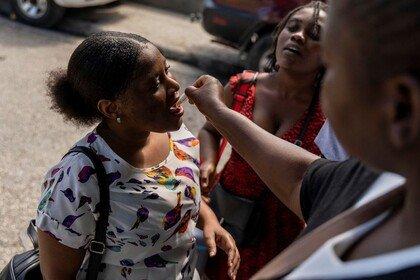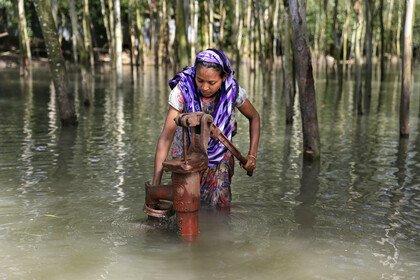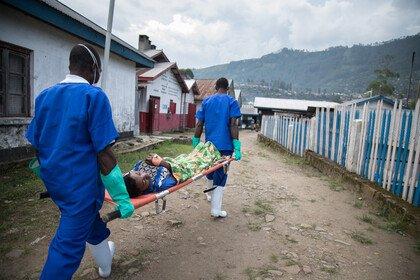
Summary
- Cholera is a deadly but preventable disease caused by consuming contaminated food or water.
- It affects up to four million people and causes 143,000 deaths each year, and it’s on the rise.
- Children under five are particularly vulnerable to cholera, especially in crisis-affected areas.
- Clean water, sanitation and hygiene are critical to preventing cholera – but many communities still lack these essentials.
- Oral cholera vaccines are central to cholera prevention, but a global shortage leaves millions without protection.
- Wellcome is funding research to better understand outbreaks, improve vaccines and support long-term prevention.
What is cholera?
Cholera is a severe diarrhoeal disease caused by consuming water or food contaminated with the bacteria Vibrio cholerae. Symptoms include diarrhoea and vomiting which can lead to severe dehydration. It can strike quickly, sometimes within hours of exposure, and without prompt treatment, it can be fatal.
Treatment of cholera involves rehydration therapy – either through oral rehydration solution or intravenous fluids. These treatments save lives, but only if they’re available and administered in time.
Who is most at risk of cholera?
Cholera doesn’t affect everyone equally. It targets the most vulnerable: those living in poverty, displacement or crisis.
In particular, cholera continues to pose a serious threat in many low- and middle-income countries, where outbreaks are intensified by humanitarian crises, inadequate sanitation and restricted access to clean water. Climate change is making these conditions worse.
How is cholera spread?
In many parts of Africa and Asia, cholera outbreaks follow predictable patterns – emerging after floods, during droughts, or in the wake of conflict. These events disrupt water supplies, force people into overcrowded shelters, and overwhelm local health services.
A recent report shows that one in four people around the world do not have access to safe drinking water. In areas where clean water is scarce and sanitation is poor, cholera spreads rapidly. This happens when people consume food or water that is contaminated with the faeces of an infected person.
Children are particularly vulnerable to cholera. In conflict affected settings, children under five are more than 20 times more likely to die from diarrhoeal diseases linked to unsafe water and sanitation than from direct violence.
Cholera prevention
Critical to the prevention of cholera is clean water, sanitation and hygiene, known collectively as WASH. Yet in many cholera-prone regions, people don’t have access to a clean water supply or proper sanitation. Extreme weather events are worsening the situation, with clean water becoming increasingly scarce.
Vaccines also offer an important layer of protection against cholera. The oral cholera vaccine (OCV) is used in emergency settings and high-risk areas. While it is effective, supply is limited, and the vaccine doesn’t offer long-term immunity or full protection for all age groups, particularly for children under five. There’s also a shortage of vaccines available for routine use in endemic areas, which leaves millions without protection.
Cholera is a solvable problem
Not only does cholera take lives; it undermines education, disrupts economies, and deepens inequality. When children are sick, they miss school. When adults are ill, they can’t work. When communities are hit by outbreaks, trust in public systems erodes.
That’s why global efforts are underway to eliminate cholera by 2030. The Global Task Force on Cholera Control (GTFCC) is central to these efforts, with a roadmap to reduce cholera deaths by 90 percent and eliminate the disease in 20 countries by 2030. To achieve this bold vision, progress needs to be made in early detection, rapid response and long-term prevention.
Cholera is a solvable problem. But eliminating the disease requires more than medicine and vaccines. It demands long term investment in infrastructure, greater global commitment to equity and a multisectoral approach, working closely with the communities who are affected.
Our role in ending cholera
Wellcome is actively supporting these efforts by investing in research to better understand, prevent and respond to the disease. This includes examining how cholera spreads and how climate change is influencing outbreaks.
We’re helping to generate evidence on the effectiveness of oral cholera vaccines, with the aim of informing decision makers, guiding vaccination strategies, and optimising how vaccines are used.
We are also supporting the development of new cholera vaccines. Increasing the global supply of affordable and more effective vaccines will be essential in supporting both outbreak response and preventive vaccination campaigns. This will ultimately help to better protect communities living in the areas most impacted by cholera.
At Wellcome, we want a healthier future for everyone. This means a future where no one dies from a preventable disease like cholera. We’re working to make that future a reality.


